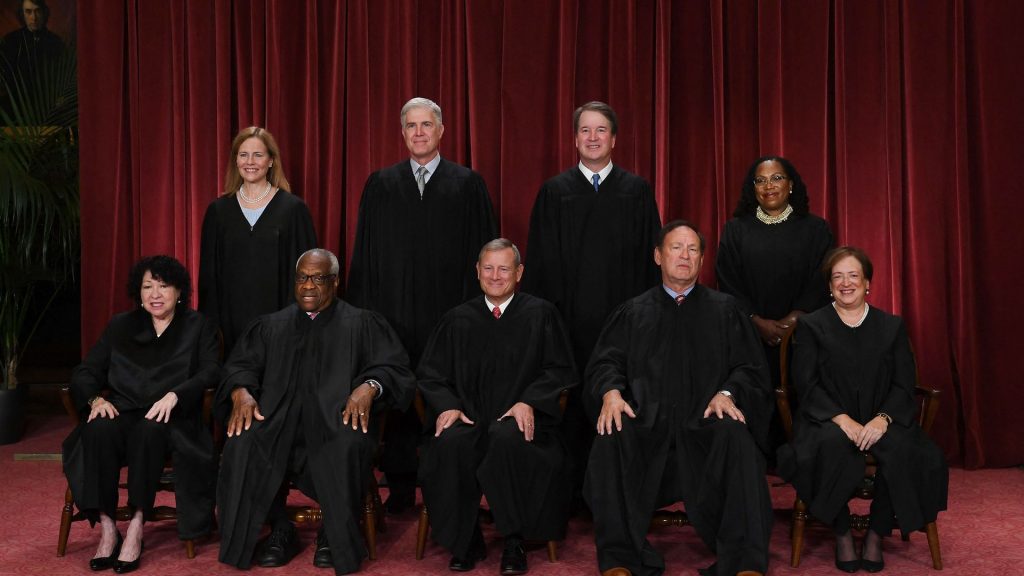What’s a nationwide injunction? SCOTUS to decide fate

The Supreme Court will hear oral arguments Thursday, May 15, in a case that may ultimately alter birthright citizenship and the 14th Amendment. It’ll take a while until we get to that point. For now, the justices will make the first-ever definitive ruling on an esoteric legal maneuver — nationwide injunctions.
Trump v. CASA Inc.
The case challenges President Donald Trump’s Jan. 20 executive order instructing federal agencies not to issue U.S. citizenship documents to babies whose parents are in the country unlawfully, or are in the country lawfully but on a temporary basis.
Multiple organizations and states sued, arguing the order violates the 14th Amendment’s citizenship clause, which states, “All persons born or naturalized in the United States, and subject to the jurisdiction thereof, are citizens of the United States and of the State wherein they reside.”
In three cases, district courts imposed nationwide injunctions, barring the federal government from enforcing the order. Now the justices are deciding — did the courts err?
What is a nationwide injunction?
A nationwide injunction, sometimes called a universal injunction, is a court order that prohibits the government, or an administration, from enforcing a law or regulation across the country.
No federal statute explicitly allows them, nor limits them. The Supreme Court has never formally ruled on their legality, although justices have certainly shared their opinions.
Supreme Court Justice Elena Kagan, a liberal member of the court, once stated, “It just can’t be right that one district judge can stop a nationwide policy in its tracks and leave it stopped for the years that it takes to go through the normal process.”
Justice Clarence Thomas, a conservative, called them historically and constitutionally “dubious”.
Injunctions come in three forms:
- A temporary restraining order, which blocks an action while the court makes decisions about the future of the case
- Preliminary injunctions, which stay in place while the case works its way through the court system for a final decision
- Permanent injunctions, which are put in place if and when the law or regulation in question is ruled unconstitutional
Judges are supposed to use a four-part test when determining whether an injunction is appropriate:
- The plaintiff is likely to succeed and ultimately win the case
- The plaintiff is likely to suffer irreparable harm without relief
- The “balance of equities” is in the plaintiff’s favor
- An injunction is in the public interest
Opponents of nationwide injunctions contend that it gives individual district court judges the power to alter law across the country. They contend injunctions should be limited to the district of the judge who imposes them.
They also oppose the fact that injunctions often apply to everyone, not just the parties involved in the case. So if an individual plaintiff sues and gets an injunction, it applies to everyone else in their situation, even those who are not part of the lawsuit. This is called non-party relief.
In general, those who support nationwide injunctions state they prevent nationwide harm and reduce the burden of litigation by preventing all interested parties from having to either file or join lawsuits.
In Trump v. CASA, the plaintiffs argue that the nationwide injunction is necessary to prevent injury to plaintiffs and to ensure uniformity in law. They also contend that non-party relief is in line with Article III of the Constitution.
Is Congress doing anything?
During the first two months of his term, federal courts issued 17 nationwide injunctions against President Trump’s policies. That led Republicans to introduce legislation that would ban the practice.
“This clear overreach was never envisioned by the Framers of the Constitution. This important legislation will be a tool to help stop the unreasonable restraints on Executive Authority,” Sen. Ashley Moody, R-Fla., said in a statement.
The bill has not advanced through committee.




